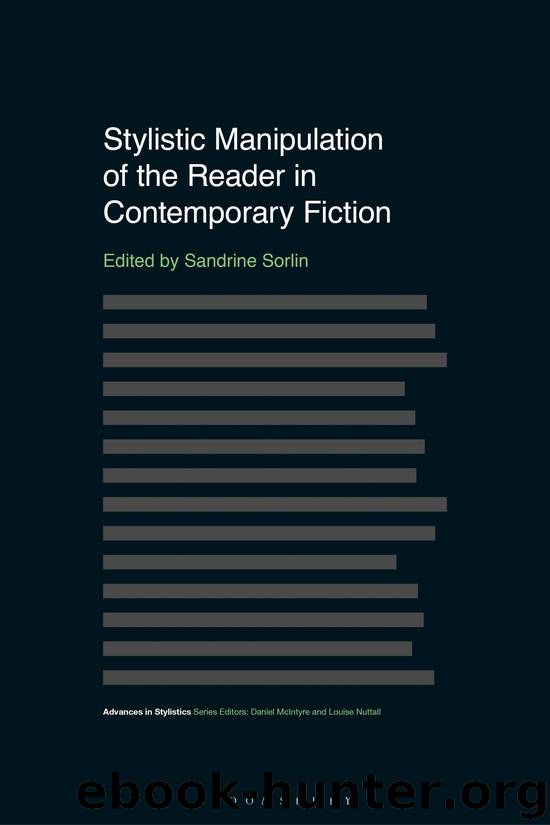Stylistic Manipulation of the Reader in Contemporary Fiction by Sandrine Sorlin;

Author:Sandrine Sorlin;
Language: eng
Format: epub
Publisher: Bloomsbury UK
7
Surprise and story ending: Readers’ responses to textual manipulation in a short story by J. D. Salinger
Laura Hidalgo-Downing
1. Introduction
The present chapter explores the relation between textual features and how real readers respond to the unexpected ending of the short story ‘A Perfect Day for Bananafish’, by J. D. Salinger (1953) and how they interpret the whole story in the light of the ending. The motivation for the study arises from my personal reading of the short story, as I was indeed surprised by the ending. This led to my interest, as a stylistician, in exploring the way in which specific textual strategies employed in the story had successfully led to this surprising resolution. The importance of story endings has been pointed out in the literature (Prince 2003; Rabinowitz 2002; Richardson 2002; Toolan 2009, 2016). Within the stylistics literature on short stories, most studies have focused on the analysis of textual features which characterize narrative sequences and on the phenomenon of closure (or lack thereof), with hardly any research on readers’ responses to narrative development and story endings (for exceptions, see Sanford and Emmott 2012; Toolan 2016). Specific research within stylistics and cognitive poetics has focused on the rhetorical manipulation techniques in genres such as detective fiction (Emmott and Alexander 2010; Emmott, Sanford and Alexander 2010; Emmott and Alexander 2019) and political thriller fiction (Sorlin 2016). Some experimental research has been carried out on readers’ anticipation of closure in short stories (Lohafer 2003). Although the need to establish connections between the observation of textual features in fiction and the responses by readers has been pointed out (see, e.g. Toolan 2016) hardly any research has been carried out from this integrative perspective. Following research into the narrativity of short stories (Toolan 2009, 2013, 2016), the present chapter contributes to the study of the narrative significance of a story ending by bridging the gap between these two complementary approaches to the study of narrative fiction in a short story, namely, the study of textual features of the text and the effect of such strategies on real readers. The present study focuses on some textual features which require increased reader attention, such as the title and the ending, and those which perform a manipulating function in distracting the reader and leading her to the final surprising effect.
For this purpose, the short story is first analysed briefly by focusing on the manipulation techniques that can be observed, and this is followed by an experimental study with a group of students, who read the story in two stages. The objectives of the study are to explore (1) students’ anticipations of the ending, (2) their emotional response to it, (3) their interpretation of the story in the light of the ending, (4) the metaphoric interpretations of the story in relation to the title, and (5) their ethical considerations regarding the topic touched upon in the ending, the protagonist’s suicide. Students are asked to provide justification of their interpretations by referring to textual clues in the story. Additionally, the
Download
This site does not store any files on its server. We only index and link to content provided by other sites. Please contact the content providers to delete copyright contents if any and email us, we'll remove relevant links or contents immediately.
The Rules Do Not Apply by Ariel Levy(4525)
Bluets by Maggie Nelson(4263)
Too Much and Not the Mood by Durga Chew-Bose(4096)
Pre-Suasion: A Revolutionary Way to Influence and Persuade by Robert Cialdini(3978)
The Motorcycle Diaries by Ernesto Che Guevara(3788)
Walking by Henry David Thoreau(3685)
What If This Were Enough? by Heather Havrilesky(3199)
Schaum's Quick Guide to Writing Great Short Stories by Margaret Lucke(3189)
The Daily Stoic by Holiday Ryan & Hanselman Stephen(3111)
The Day I Stopped Drinking Milk by Sudha Murty(3106)
Why I Write by George Orwell(2775)
The Social Psychology of Inequality by Unknown(2768)
Letters From a Stoic by Seneca(2673)
A Short History of Nearly Everything by Bryson Bill(2510)
Insomniac City by Bill Hayes(2399)
Feel Free by Zadie Smith(2379)
A Burst of Light by Audre Lorde(2349)
Upstream by Mary Oliver(2273)
Behave: The Biology of Humans at Our Best and Worst by Robert M. Sapolsky(2176)
